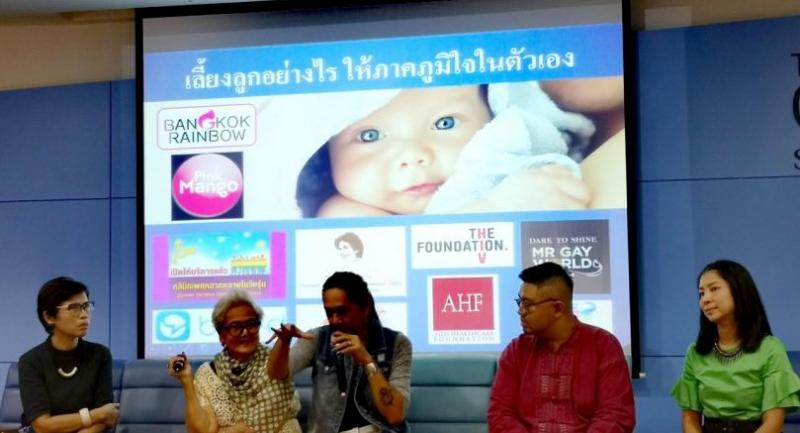Gen-V clinic: Finding the path to family understanding

Many parents put their children in the hands of physicians at Bangkok’s Gender Variation Clinic, popularly known as Gen-V clinic, with one expectation in mind – that their child will undergo “conversion therapy” and emerge with a heterosexual identity or one based on the gender they were assigned by the doctor at birth.
That parents might expect such identity conformity may seem out of sorts in a country known internationally as a destination for “gender reassignment” surgery and as a gay paradise. But parents often arrive at the clinic distraught over their child’s behaviour or declared identity.
Chatchai Jaruwatee, a parent who recently organised a controversial forum at a private school, said he considers his son “straight” but would consider attending the clinic if identity issues arose in his family.
“I heard Ramathibodi Hospital has a clinic to treat children with ‘gender confusion’,” he told The Nation. “Even medical circles say such a thing can be treated. If there is anything I can do, I will do it to help my son.”
However, the Gen-V clinic says it mission is to offer consultation and not “conversion”.
Conversion therapy is, medically speaking, impossible, said Dr Jiraporn Arunakul, one of the Gen-V clinic’s physicians, speaking to a seminar held by Bangkok Rainbow and its network last Tuesday.

The clinic does not treat sexual orientation and gender identity, but rather offers consultation to build a household where parents love and accept their children regardless of their identities and despite the parents’ own beliefs, Jiraporn said.
“Many parents, especially those with a strong religious attitude, are deeply agonised when they come to us. They truly believe their children will go to hell,” she said. The clinic staff work to find a positive path for the family.
“After consultation [at the clinic], one Muslim mother told me she [still] believed her son would go to hell, but she didn’t want him to ‘live in hell’ now.”
Jiraporn said almost every parent visiting the Gen-V clinic thinks it is “abnormal” to identify as a gender other than what was assigned at birth by a doctor, or a non-heterosexual orientation. A large majority of Thais tolerate LGBT (Lesbian, Gay, Bisexual, and Transgender) people on the streets and in the media, but not so much at home.
About 10 per cent of respondents in a 2015 poll by the National Institute of Development Administration Thailand said they could not accept LGBT people as friends or colleagues, and 16.8 per cent said they could not tolerate a family member identifying as LGBT. The most popular reason given by those who were more accepting was “if it happens, we must come to terms with it”.
Under the surface of LGBT tolerance “most parents view [diverse orientation and identity] as problematic or something they must accept because nothing can be done, but deep down they don’t truly accept or understand it,” said Vitaya Saeng-aroon, a gay media specialist and columnist based in Bangkok.
“It was a sad thing for a child. Many kids hide [their sexual identity] just to be loved. It is truly suffering,” Pauline Ngampring, a high-profile transgender, told the seminar.
A leading all-male school presented a traditional view when it held a “sexual deviation” forum organised by Chatchai, and drew condemnation from some citizens and the LGBT community. Some parents of Bangkok Christian College school students organised a forum last Monday on how to raise a child not to be “sexually deviated”. One parent organiser said he empathised with LGBT people for their suffering, but did not want his son to be one of them.
“If one of the reasons my son becomes gay is the way I raise him, we must learn and avoid it before it happens,” he said.
The school and parents may have had good intentions, but such a forum could add fire to abuse and bullying faced by LGBT students, said Naiyana Supapung, former member of the National Human Rights Commission and a campaigner for LGBT rights. Over half of LGBT students from Grade 7 to 12 reported being abused physically, verbally, or sexually in a 2014 study done by Mahidol University, Plan International Thailand and Unesco.
Asked why discrimination against sexually diverse people persists, Vitaya pointed to discriminatory content about gender and sexuality in Thai media and school textbooks.
“The media likes to ‘sell’ LGBT content, but it reinforces negative or violent images on people like us,” Vitaya said, citing headlines such as “Violent Tomboy kills girlfriend” prevalent in Thai news reports. “These headlines are attractive to viewers, but they impose stereotypes on LGBT people and make the public views us as violent,” he said.
School textbooks are his other concern. Local news agency Prachatai last year reported that the Education Ministry’s textbooks for Grade 7 students across Thailand were fuelling homophobic attitudes. The textbook described LGBT people as “extremely mentally ill” and advises “sexual deviated” students to “keep it hidden”.
That needs to change, says Vitaya. “Much progress has been made in this world, why do we keep using outdated information and keep producing bias,” he asked.
Mislabelling homosexuality has a long history, including its 1974 classification as a mental disorder in the United States. After a struggle, it was removed from the American Psychiatric Association’s Diagnostic and Statistical Manual of Mental Disorder in 1987. It took another five years before the World Health Organisation (WHO) also removed homosexuality from a list of mental disorders, and as recently as June this year, the WHO declassified being transgender as a mental illness.
In 2015, Thailand enacted the Gender Equality Act to ban discrimination against people based on their sexual orientation, and Justice Minister Prajin Juntong has vowed to finish drafting a Life Partnership Bill by the end of this month.
If the bill is passed, Thailand would be the first country in Southeast Asia to allow same-sex couples some of the benefits enjoyed by straight couples, including inheritance rights and potentially reduced taxes.
